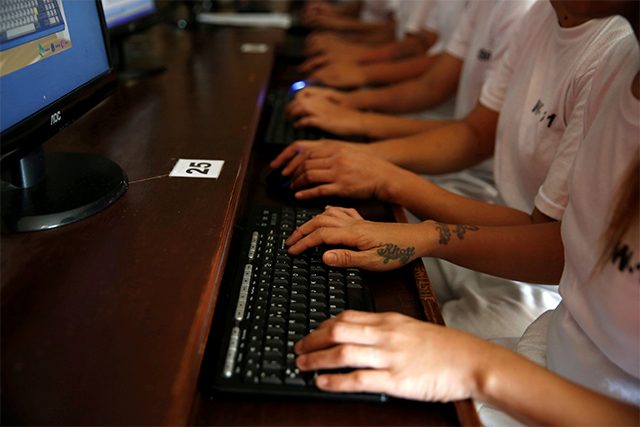
BANGKOK (Thomson Reuters Foundation) — Cases of online child sex abuse in the Philippines have tripled under coronavirus, the government said, with campaigners warning that the country’s lockdown has left more children vulnerable to exploitation by human traffickers and cash-strapped relatives.
The spread of cheap, high-speed internet and the rise in mobile phone ownership has fueled livestreamed abuse – known as cybersex trafficking – in recent years and the Philippines is considered by charities to be the epicenter of the global trade.
Officials and activists said the problem has worsened under lockdown in the capital, Manila – one of the world’s longest at 11 weeks – as families have struggled to earn a living while children have been out of school and spending more time online.
The Southeast Asian nation has recorded about 15,580 cases of coronavirus and 921 deaths since the outbreak hit in January.
“Now that people are required to stay at home, many suffer from a loss of income from the shutdown,” Emmeline Villar, an undersecretary at the Department of Justice (DoJ), told the Thomson Reuters Foundation.
“(This) makes it more likely that the traffickers will engage in abusive behavior,” Villar added.
From March 1 to May 24, there were 279,166 cases of online child sex abuse in the Philippines, said the DoJ, using data from the U.S.-based National Center for Missing and Exploited Children. There were 76,561 cases during this timeframe in 2019.
The country’s justice department earlier this week urged internet service providers to install technology to block both access to and distribution of child abuse imagery.
Yet the crime is tough to crack because abuse often involves family members or friends, according to officials and activists.
“This is largely a family-based crime meaning home is a place of vulnerability and exploitation, rather than a place of safety,” said Samson Inocencio, national director of the International Justice Mission (IJM) – an anti-slavery charity.
In operations supported by the IJM in the Philippines since 2011, more than half of those arrested for online child sex abuse were parents, relatives or family friends, the group said.
“Lockdowns also pose a barrier to detection because children have almost no access to teachers or community members to whom they might disclose abuse or display signs,” Inocencio added.
A recent study by IJM found the prevalence of online child sex abuse in the nation rose significantly from 2014 to 2017.
A Philippines court this week sentenced a U.S. citizen based in the country, David Deakin, to life imprisonment for three counts of human trafficking. Deakin had recorded child sex abuse and sold it to foreign customers online, the authorities said.
Europe’s policing agency, Europol, last week said it was concerned by a rise in paedophile activities, with EU law enforcement observing more searches for illegal websites and shutting more platforms for the exchange of child sex material.
The United Nations children’s agency (UNICEF) estimates 1.8 million children are sex trafficked every year – but this figure does not include victims of cybersex trafficking.—Reporting by Nanchanok Wongsamuth @nanchanokw; Editing by Lyndsay Griffiths and Kieran Guilbert.









